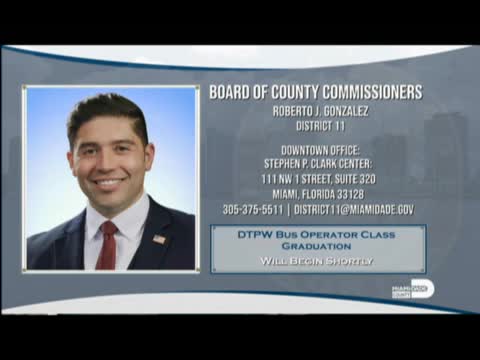Miami-Dade Transit marks completion of Bus Class 2 training; county leaders highlight service and safety
Get AI-powered insights, summaries, and transcripts
Subscribe
Summary
Miami-Dade County Department of Transportation and Public Works held a graduation for Bus Class 2 of 2025, marking completion of a multi-week training program that includes FMCSA entry-level driver training, CDL instruction and emergency preparedness; county officials emphasized passenger safety and public-service responsibilities.
Miami-Dade County Department of Transportation and Public Works held a graduation ceremony for Bus Class 2 of 2025 to mark the completion of the division’s multi-week bus operator and traffic-control training program.
The graduation recognizes trainees who completed coursework and behind-the-wheel instruction required by federal and county programs, and county leaders used the event to stress safety, customer service and the public-service role of transit operators.
“ We are gathered here to celebrate your dedication, your perseverance, and the remarkable achievement of completing the MDT PW training program,” said Quanee Smith, co‑lead instructor for Bus Class 2, addressing the graduates and their families. The ceremony included remarks from instructors, division leadership and a letter from Miami‑Dade County Mayor Daniella Levine Cava read on her behalf.
Why it matters: County officials said bus operators affect daily mobility for large numbers of riders. Snyder Saint Preux, general superintendent of bus operations, told graduates that transit staff handle high daily ridership and that how operators present themselves and treat passengers has a direct impact on riders’ days: “You deal with nearly 180,000 passengers on a daily basis,” he said, adding that total daily riders across all modes approach 220,000.
Training and curriculum details: Carlos Garcia, supervisor of training, outlined the curriculum and testing components instructors used in the class. He said the program covers the Federal Motor Carrier Safety Administration (FMCSA) materials and entry-level driver training (ELDT), a DTPW bus operator student manual and the division’s operations and maintenance policy and procedures manual (the “blue book”). According to Garcia, the course includes Federal Motor Carrier Safety Administration material (ELDT), dedicated CDL training and testing beginning in the first week and lasting about eight weeks, an eight‑hour National Safety Council certification segment, emergency training such as hurricane evacuation procedures, and multiple quizzes and tests over roughly a 10‑week program.
County leadership and guidance: Jimmy Morales, chief operating officer for Miami‑Dade County, called the work “a career in public service” and encouraged new operators to view their roles as essential to the community. Joel Perez, assistant director of bus services, reminded graduates to use the supports available through superintendents, instructors and division leadership: “Please make sure that you put all that into practice,” he said.
Program supports and opportunities: Speakers emphasized career growth and departmental support. Fabio Londono, general superintendent of bus maintenance, and other managers described internal pathways from operator and mechanic roles into supervisory positions. Saint Preux also noted hiring was ongoing and encouraged attendees to consider advancement opportunities.
Certificates and pledge: Instructors presented certificates of completion and led attendees through a professional bus operator pledge that included commitments to safe driving, pedestrian scanning and customer service. The ceremony ended with an invitation for graduates and families to take photos with instructors and management staff.
Details from the ceremony: Presenters named graduates individually during the certificate presentation and the transcript records dozens of names called during the ceremony. County presenters who spoke at the event included instructors and division leadership representing Miami‑Dade Transit and the Department of Transportation and Public Works.
What wasn’t decided or changed: The event was ceremonial and educational; no legislative actions, budget votes or policy adoptions were recorded at the ceremony.
Photos and next steps: Organizers said photos would be taken on stage after the ceremony. Several speakers reminded graduates that many would begin operating buses in the immediate days after the ceremony and urged them to carry the training into daily practice.
